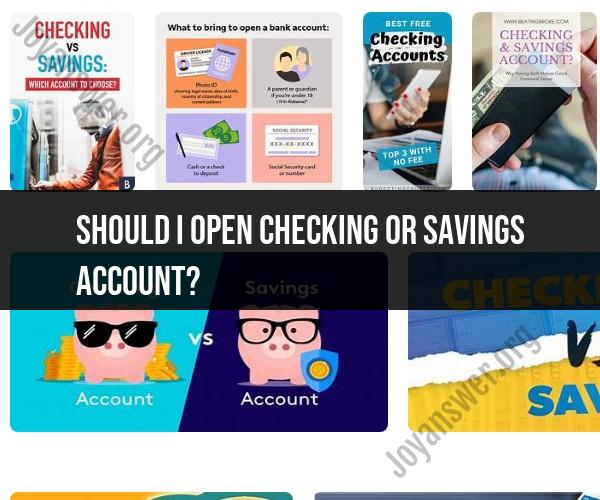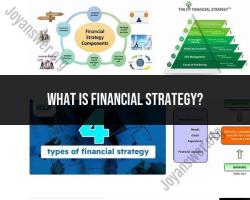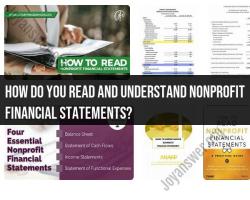Should I open checking or savings account?
Whether you should open a checking or savings account depends on your financial goals and how you plan to use the account. Each type of account serves different purposes, and you can even have both types of accounts to meet various financial needs. Here are some considerations to help you make the right decision:
1. Checking Account:
- Everyday Transactions: A checking account is designed for everyday financial transactions. You can use it to deposit your paychecks, pay bills, make purchases with a debit card, and withdraw cash from ATMs.
- Accessibility: Checking accounts offer easy access to your funds, making it convenient for managing your day-to-day expenses.
- No Withdrawal Limits: Checking accounts typically do not have limits on the number of withdrawals or transactions you can make in a month.
- Overdraft Protection: Some checking accounts offer overdraft protection, which can help you avoid overdrawing your account and incurring fees.
- Frequent Deposits and Withdrawals: If you need to deposit money regularly or make frequent withdrawals, a checking account is a suitable choice.
2. Savings Account:
- Saving and Emergency Funds: A savings account is ideal for saving money over the long term and building an emergency fund. It offers a safe place to keep your savings separate from your everyday spending.
- Interest Earnings: Savings accounts typically offer higher interest rates compared to checking accounts. This allows your money to grow over time.
- Limited Transactions: Savings accounts often have limits on the number of withdrawals or transfers you can make each month, usually around six. This encourages you to save rather than spend.
- Goal-Oriented: If you have specific financial goals, such as saving for a vacation, a down payment on a house, or retirement, a savings account can help you track and achieve those goals.
- Emergency Fund: It's recommended to have an emergency fund, and a savings account is an ideal place to keep it because it's easily accessible in case of unexpected expenses.
Considerations for Both:
- Fees: Check for any fees associated with the account, such as monthly maintenance fees or ATM fees. Some accounts waive fees if you meet certain requirements.
- Online vs. Brick-and-Mortar: Decide whether you prefer an online bank or a traditional brick-and-mortar bank. Online banks often offer higher interest rates and lower fees.
- Minimum Balance: Some accounts require a minimum balance to avoid fees, so make sure it aligns with your financial situation.
- Accessibility: Consider the availability of ATMs and branches if you prefer in-person banking.
In many cases, individuals have both checking and savings accounts to separate their everyday spending from their savings goals. This approach allows you to manage your finances effectively, access your funds when needed, and earn interest on your savings. Ultimately, the decision should be based on your financial needs and goals.
Making Financial Choices: Deciding Between a Checking or Savings Account
When choosing between a checking or savings account, it is important to consider your financial needs and goals. Here is a brief overview of the two types of accounts to help you make a decision:
- Checking accounts are designed for everyday transactions, such as writing checks, paying bills, and using a debit card. Checking accounts typically have a lower interest rate than savings accounts, but they also offer easier access to your money.
- Savings accounts are designed to save money for future goals, such as a down payment on a house or retirement. Savings accounts typically have a higher interest rate than checking accounts, but they may also have restrictions on how often you can withdraw money.
Here are some things to consider when choosing between a checking and savings account:
- How often do you need to access your money? If you need to access your money frequently, then a checking account is probably the best option for you. Checking accounts offer easy access to your money through checks, debit cards, and ATMs.
- What are your financial goals? If you are saving money for a future goal, such as a down payment on a house or retirement, then a savings account is probably the best option for you. Savings accounts typically have a higher interest rate than checking accounts, which can help you grow your money faster.
- What are the fees associated with each account? Some banks charge fees for checking and savings accounts. Be sure to compare the fees associated with each account before you open one.
Here are some tips for using checking and savings accounts effectively:
- Keep your checking and savings accounts separate. This will help you to track your spending and savings more easily.
- Set up a monthly budget. This will help you to track your income and expenses and make sure that you are not spending more money than you are earning.
- Transfer money from your checking account to your savings account on a regular basis. This will help you to save money for future goals.
- Review your checking and savings accounts regularly. This will help you to track your spending and savings and make sure that you are on track to meet your financial goals.
Conclusion
Ultimately, the best way to decide which type of account is right for you is to consider your financial needs and goals. If you need to access your money frequently and are not saving for a specific goal, then a checking account is probably the best option for you. If you are saving money for a future goal, then a savings account is probably the best option for you.













